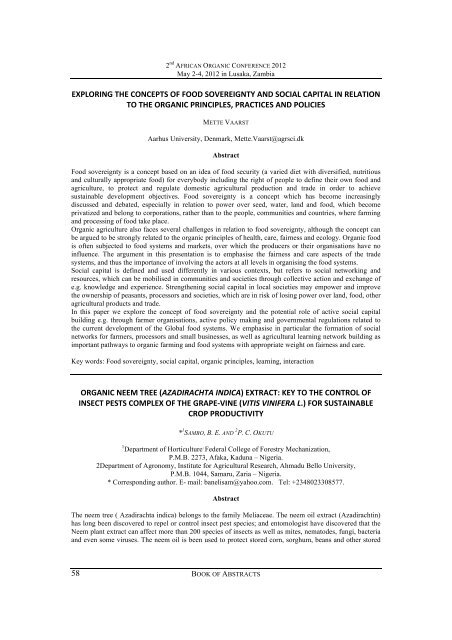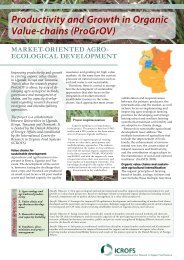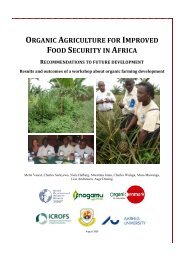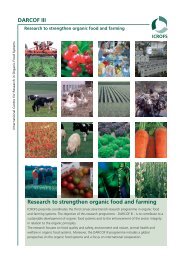The 2nd African Organic Conference â Mainstreaming ... - ICROFS
The 2nd African Organic Conference â Mainstreaming ... - ICROFS
The 2nd African Organic Conference â Mainstreaming ... - ICROFS
Create successful ePaper yourself
Turn your PDF publications into a flip-book with our unique Google optimized e-Paper software.
2 nd AFRICAN ORGANIC CONFERENCE 2012<br />
May 2-4, 2012 in Lusaka, Zambia<br />
EXPLORING&THE&CONCEPTS&OF&FOOD&SOVEREIGNTY&AND&SOCIAL&CAPITAL&IN&RELATION&<br />
TO&THE&ORGANIC&PRINCIPLES,&PRACTICES&AND&POLICIES&<br />
METTE VAARST<br />
Aarhus University, Denmark, Mette.Vaarst@agrsci.dk<br />
Abstract<br />
Food sovereignty is a concept based on an idea of food security (a varied diet with diversified, nutritious<br />
and culturally appropriate food) for everybody including the right of people to define their own food and<br />
agriculture, to protect and regulate domestic agricultural production and trade in order to achieve<br />
sustainable development objectives. Food sovereignty is a concept which has become increasingly<br />
discussed and debated, especially in relation to power over seed, water, land and food, which become<br />
privatized and belong to corporations, rather than to the people, communities and countries, where farming<br />
and processing of food take place.<br />
<strong>Organic</strong> agriculture also faces several challenges in relation to food sovereignty, although the concept can<br />
be argued to be strongly related to the organic principles of health, care, fairness and ecology. <strong>Organic</strong> food<br />
is often subjected to food systems and markets, over which the producers or their organisations have no<br />
influence. <strong>The</strong> argument in this presentation is to emphasise the fairness and care aspects of the trade<br />
systems, and thus the importance of involving the actors at all levels in organising the food systems.<br />
Social capital is defined and used differently in various contexts, but refers to social networking and<br />
resources, which can be mobilised in communities and societies through collective action and exchange of<br />
e.g. knowledge and experience. Strengthening social capital in local societies may empower and improve<br />
the ownership of peasants, processors and societies, which are in risk of losing power over land, food, other<br />
agricultural products and trade.<br />
In this paper we explore the concept of food sovereignty and the potential role of active social capital<br />
building e.g. through farmer organisations, active policy making and governmental regulations related to<br />
the current development of the Global food systems. We emphasise in particular the formation of social<br />
networks for farmers, processors and small businesses, as well as agricultural learning network building as<br />
important pathways to organic farming and food systems with appropriate weight on fairness and care.<br />
Key words: Food sovereignty, social capital, organic principles, learning, interaction<br />
ORGANIC&NEEM&TREE&(AZADIRACHTA&INDICA)&EXTRACT:&KEY&TO&THE&CONTROL&OF&<br />
INSECT&PESTS&COMPLEX&OF&THE&GRAPE:VINE&(VITIS&VINIFERA&L.)&FOR&SUSTAINABLE&<br />
CROP&PRODUCTIVITY&&<br />
* 1 SAMBO, B. E. AND 2 P. C. OKUTU<br />
1 Department of Horticulture , Federal College of Forestry Mechanization,<br />
P.M.B. 2273, Afaka, Kaduna – Nigeria.<br />
2Department of Agronomy, Institute for Agricultural Research, Ahmadu Bello University,<br />
P.M.B. 1044, Samaru, Zaria – Nigeria.<br />
* Corresponding author. E- mail: banelisam@yahoo.com. Tel: +2348023308577.<br />
Abstract<br />
<strong>The</strong> neem tree ( Azadirachta indica) belongs to the family Meliaceae. <strong>The</strong> neem oil extract (Azadirachtin)<br />
has long been discovered to repel or control insect pest species; and entomologist have discovered that the<br />
Neem plant extract can affect more than 200 species of insects as well as mites, nematodes, fungi, bacteria<br />
and even some viruses. <strong>The</strong> neem oil is been used to protect stored corn, sorghum, beans and other stored<br />
58<br />
BOOK OF ABSTRACTS





